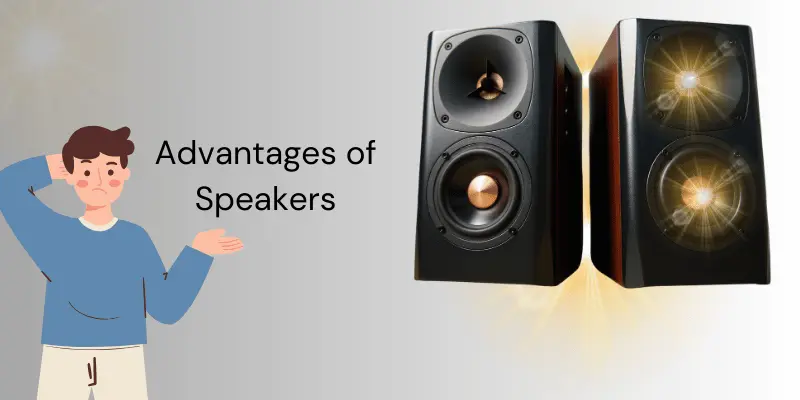Top 5 Advantages and Disadvantages of Modern Speakers
Published: 4 Jul 2025
Do you get frustrated when low-quality audio ruins your favorite TV, music, or games? Speakers claim to solve it, but they aren’t always successful. Speakers face many types of challenges, such as from connectivity issues to high expenses. In this post, we’ll discuss the benefits and drawbacks of speakers, so you can decide if they’re worth it for you.
Advantages of Speakers
Speakers improve audio quality, making entertainment, communication, and learning more enjoyable. Let’s look at their major advantages in detail.

1. Enhanced Sound Quality
Speakers provide a significantly richer audio environment than built-in laptop or smartphone speakers. This makes them excellent for activities such as listening to music, viewing movies, and even hosting online meetings. Surround sound speakers, for example, create a full theater-like feeling in your home by bringing every sound to life.
2. Versatility in Use
Speakers are made to support a variety of lifestyles and needs. Portable Bluetooth speakers are perfect for outdoor travel, whereas smart speakers such as Amazon Echo or Google Nest integrate with smart home devices, making daily tasks easier to do. Whether it’s a simple music practice or an organized function, there’s a speaker for everyone.
3. Improved Entertainment Experience
High-quality speakers enhance enjoyment, making them best for gamers and music lovers. Gamers, for example, benefit from positional audio in games, although music fans enjoy better bass and clarity on their favorite sounds. This level of explanation brings excitement to regular fun.
4. Assist in Education and Communication
Speakers are useful tools in schools, offices, and public events. They ensure that everyone in the classroom listens to the speaker well, which helps learning and communication. External speakers in online classrooms ensure that students don’t miss any essential knowledge.
5. Wide Range of Options
Speakers come in many different types of shapes and sizes, ranging from small portable models to powerful home theater systems. This range allows users to select the right model according to affordability and preferences, enabling accessibility for all.
Test Your Laptop Speakers
You can use our Laptop Speaker Test Tool to check if your laptop’s speakers are working correctly by testing the left and right channels separately.
Disadvantages of Speakers
With their benefits, speakers face challenges such as high costs, upkeep, and space constraints. Here is a list of their downsides.

1. Power Consumption
Large and powerful speakers typically consume a lot of electricity, which can increase energy expenses over time. For example, a home theater setup with several speakers can consume a lot of electricity, especially if it’s used on a daily basis.
2. Space Requirements
Some speakers, such as huge sound systems or floor-standing speakers, take up a lot of space. These speakers are not ideal for people with limited living space, particularly in smaller apartments.
3. Interference Issues
Wireless speakers frequently have issues with connection. Bluetooth devices, for example, can suffer delay or disruption as a result of interference from other nearby devices. These concerns have the potential to interfere with listening.
4. Cost
Although there are some cheap options, high-end speaker systems with outstanding audio performance can be expensive. An excellent example is Dolby Atmos-enabled soundbars or systems, which are more expensive but deliver higher audio quality.
5. Maintenance and Durability
Speakers are delicate and demand careful handling. Dust or bad maintenance can harm their components, including the diaphragm and wiring. Periodic careful placement is required to keep them in okay condition.
Related Articles 👇👇👇
Advantages and Disadvantages of Webcams
Laptop vs Desktop: Pros and Cons
Pros and Cons of Thin and Lightweight Laptops
Advantages and Disadvantages of Computer Keyboards
Advantages and Disadvantages of Computer Mouse
Conclusion
Speakers are essential tools in the present audio-centric society, optimizing how we consume entertainment, share information, and study. While their benefits, like higher quality sound and transportation, make them a great purchase, consumers need to think about their drawbacks, which include the cost and maintaining them. By selecting the best speaker model for your requirements—whether it’s a portable Bluetooth speaker or a home theater system for complete entertainment—you can enjoy the benefits while minimizing potential drawbacks.
More Expensive – Active speakers come with built-in amplifiers, which makes them costlier than passive speakers.
Limited Upgrade Options – You can’t easily upgrade the amplifier or other internal parts since everything is built-in.
Heavier and Bulkier – They require more space and are heavier because of the added electronics.
More Power Cables Needed – Each speaker needs a power source, which adds to cable clutter.
Not Ideal for Large Setups – For large audio systems, managing multiple active speakers can become complex and impractical.
- Privacy Concerns – Smart speakers are always listening for voice commands, raising concerns about data collection and surveillance.
- Limited Audio Quality – Most smart speakers focus more on features than high-end sound, which may not satisfy audiophiles.
- Dependence on Internet – Without an internet connection, many smart features stop working.
- Compatibility Issues – Not all smart speakers work well with every smart home device or ecosystem.
- Software Limitations – Voice assistants may misinterpret commands or not understand regional accents or languages well.

- Be Respectful
- Stay Relevant
- Stay Positive
- True Feedback
- Encourage Discussion
- Avoid Spamming
- No Fake News
- Don't Copy-Paste
- No Personal Attacks

- Be Respectful
- Stay Relevant
- Stay Positive
- True Feedback
- Encourage Discussion
- Avoid Spamming
- No Fake News
- Don't Copy-Paste
- No Personal Attacks





